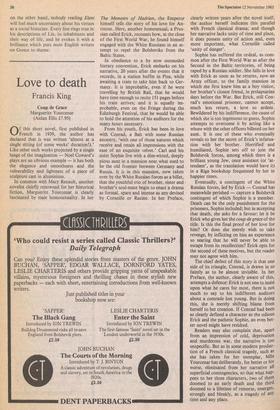Love to death
Francis King
Coup de Grace Marguerite Yourcenar (Aidan Ellis £7.95)
ry this short novel, first published in V French in 1939, the author has declared that is was written 'almost at a single sitting (of some weeks' duration I).' Like other such works projected by a single lunge of the imagination — Noel Coward's plays are an obvious example — it has both the elegance and smoothness and the vulnerability and lightness of a piece of sculpture cast in aluminium.
In common with Mary Renault, another novelist chiefly renowned for her historical fiction, Marguerite Yourcenar is clearly fascinated by male homosexuality. In her
The Memoirs of Hadrian, the Emperor himself tells the story of his love for An- tinous. Here, another homosexual, a Prus- sian called Erick, recounts how, at the close of the First World War, he found himself engaged with the White Russians in an at- tempt to repel the Bolsheviks from the Baltic States.
In obedience to a by now outmoded literary convention, Erick embarks on his narrative, 20 years after the events that it records, in a station buffet in Pisa, while awaiting a train to take him back to Ger- many. It is improbable, even if he were travelling by British Rail, that he would have time enough to recite 151 pages before his train arrives; and it is equally im- probable, even on the Fringe during the Edinburgh Festival, that he would be able to hold the attention of his auditors for the many hours necessary.
From his youth, Erick has been in love with Conrad, a Balt with some Russian ancestry, 'with one of those natures which receive and retain all impressions with the ease of an exquisite velvet.' Carl and his sister Sophie live with a dim-witted, deeply pious aunt in a mansion near, what used to be the old frontier between Germany and Russia. It is in this mansion, now taken over by the White Russian forces as a billet, that the youthful trio of brother, sister and brother's soul-mate begin to enact a drama as formal, spare and intense as any devised by Corneille or Racine. In her Preface, clearly written years after the novel itself, the author herself indicates this parallel with French classical drama; and though her narrative lacks unity of time and place, it does possess unity of action and, even more important, what Corneille called 'unity of danger'.
Sophie has suffered the ordeal, as com- mon after the First World War as after the Second in the Baltic territories, of being raped by a Russian soldier. She falls in love with Erick as soon as he returns, now an Army officer, to the family mansion in which she first knew him as a boy visitor, her brother's closest friend, in prelapsarian days before the War. But Erick, still Con- rad's emotional prisoner, cannot accept, much less return, a love so ardent. Bewildered by his indifference, the cause of which she is too ingenuous to guess, Sophie attempts to overcome it by acting like a whore with the other officers billeted on her aunt. It is one of these who eventually reveals to her the secret of Erick's infatua- tion with her brother. Horrified and humiliated, Sophie sets of to join the Bolshevik forces, among which there is a brilliant young Jew, once assistant (or 'at- tendant', as the translation would have it) in a Riga bookshop frequented by her in happier times.
Eventually, a contingent of the White Russian forces, led by Erick — Conrad has meanwhile perished — capture a Bolshevik contingent of which Sophie is a member. Death can be the only punishment for the prisoners, Sophie included; but in accepting that death, she asks for a favour: let it be Erick who gives her the coup de grace of the title. Is this the final proof of her love for him? Or does she merely wish to take revenge, by inflicting on him an experience so searing that he will never be able to escape from its recollection? Erick opts for the second of these motives, but the reader may not agree with him.
The chief defect of this story is that one side of its triangle, Conrad, is drawn in so faintly as to be almost invisible. In her Preface, the author, clearly aware of this, attempts a defence: Erick is not one to insist upon what he cares for most, there is not much to say to his indifferent auditors about a comrade lost young. But in doing this, she is merely shifting blame from herself to her creation. If Conrad had been as clearly defined a character as the odious Erick and the pathetic Sophie, an even bet- ter novel might have resulted.
Readers may also complain that, apart from an impression of cold, deprivation and murderous war, the narrative is too unspecific. But as in some modern produc- tion of a French classical tragedy, such as she has taken for her exemplar, Mlle Yourcenar has deliberately, for better or for worse, eliminated from her narrative all superficial contingencies, so that what hap- pens to her three characters, two of them doomed to an early death and the third doomed to a lifetime of remorse, emerges, strongly and bleakly, as a tragedy of any time and any place.














































 Previous page
Previous page